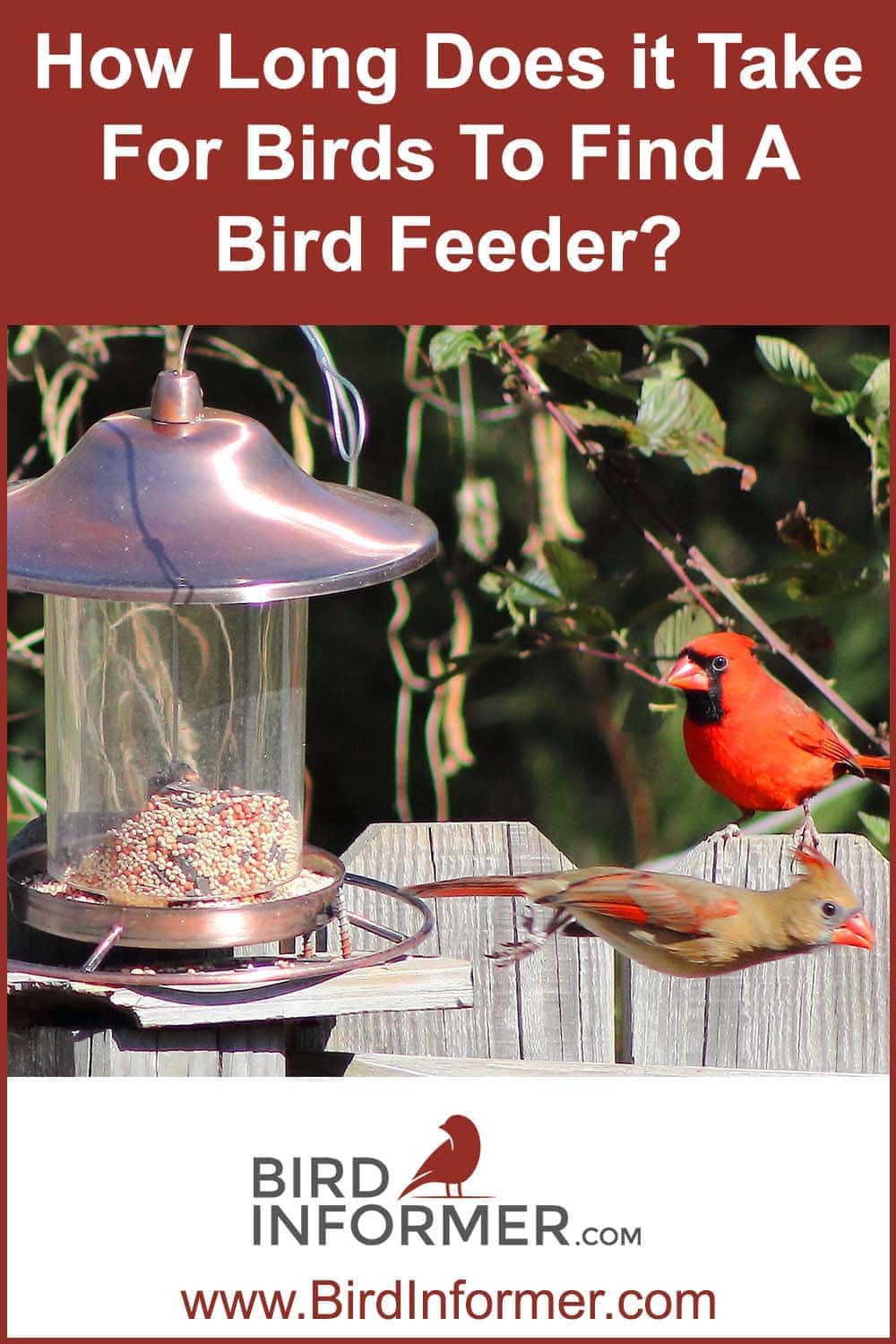Contents
Bird feeders are a neat way to feed these creatures, get in some bird watching, and add some decor to your yard. Knowing how to attract the birds to the feeder is important to help them transition from one type of feeder to another.
Birds may find your bird feeder in as little as a few hours to as long as several months. There are many factors that impact how fast birds will find your newly placed bird feeder, from visibility, proximity to other feeders, safety, and more.
In this article, we will go over:
- How long does it take for birds to find a bird feeder
- How birds find new feeders
- Tips for adding new feeders to your yard
- Troubleshooting ideas for when birds are not coming to your feeder
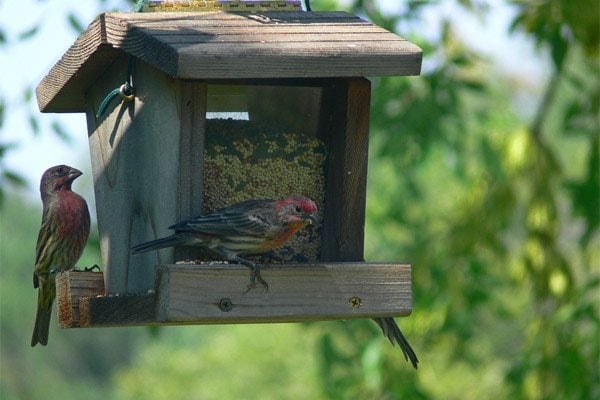
Let’s jump right into it…
How Long Before Birds Come To A New Feeder?
There is no set time before birds will find your feeder. One thing most backyard birdwatchers agree on is that a single bird feeder doesn’t usually do it for them. There are many different types of birds, and they all don’t like the same thing. It’s up to you if you choose a large feeder to bring in lots of different birds or a small one to just get a few. You also need to get different types of seeds to attract all kinds of birds. However, you should take into consideration a few things so birds can find your feeder quickly:
- Visibility – Your feeder should be able to be seen easily from a bird’s vantage point
- Multiple Perches
- Feeder Capacity
- Durability
- Pest-Resistant Features – These are things like built-in baffles and/or construction that doesn’t allow chewing
You’ll still need to be patient once you install your feeder. Birds might take time to figure it out. Once they do, hopefully, they’ll tell all of their friends so you can enjoy some birds having their dinner.
How Do Birds Find Bird Feeders?
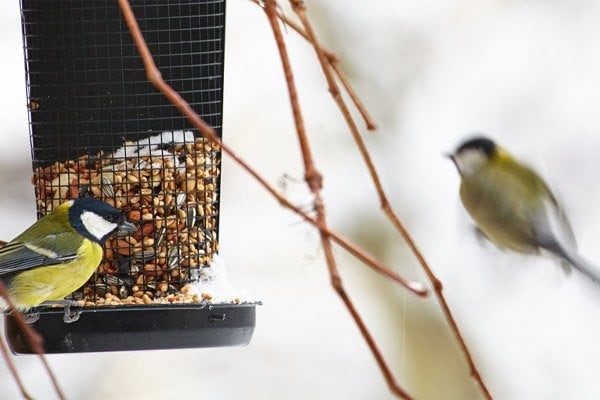
It can be a tough thing for birds to finally find your feeder. Stay patient while you wait for your friends to attend their buffet. Many people are surprised to find out that birds have almost no sense of smell. This means they can’t particularly smell your bird feed. They have great eyesight and hearing. This helps them find their food. It can take a few weeks for them to find your feeder.
Sight And Sound
Birds use their great eyesight to see the food in your feeder. They should recognize it as something they can munch on. There are sometimes multiple feeders in neighboring yards, so birds recognize them as a way to eat. They also easily find seeds when they are scattered on top of the feeder. Birds love to drink water, and they listen for this sound. When water is dropping by a feeder, they can better find it.
Check out some bird bath options in our review article where we highlight 8 of our favorites:
Adding A New Bird Feeder To Your Yard
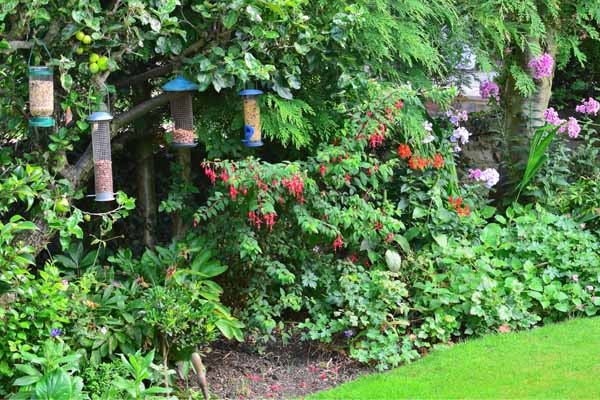
It’s an exciting thing to get ready to place a bird feeder in your yard. There’s no perfect science to it, but once you get it placed, you’ll notice birds dining at your home within weeks. There are a few things to think about as you get it ready.
Location Of Feeder
It’s important to put a feeder in a location where a bird can easily find it. They often spot these feeders when they fly over them. It is best to put feeders out in the open, away from things that obstruct visibility.
However,
Feeders near bushes and foliage are great for some birds because they like to hang out in the bushes.
In my own yard, I have GREAT success by placing feeders in locations that are easily visible but that are somewhat close to shrubs, trees, and other natural protections.
When choosing a location you should ensure it is safe from predators. Make sure you can see the feeder as well.
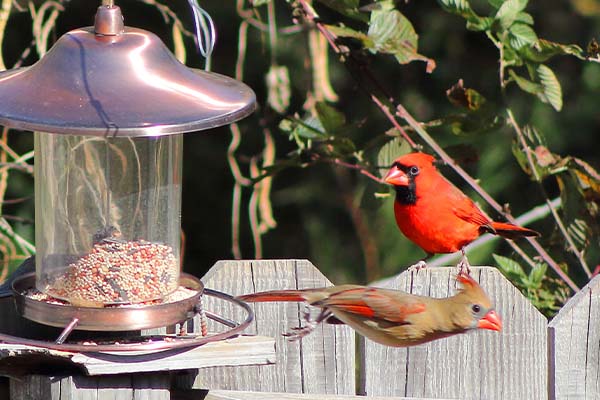
Numerous Feeders
If you already have a feeder in your yard, hang the new one in the same area. Once the birds start to eat from it, you can gradually move the new feeder away from the existing feeders. This means the birds that are a little shyer won’t have to eat with the crowds. This will also lower the potential for the spread of disease.
And,
Consider installing bird feeders that attract specific types of birds, for example, bird feeders for Cardinals, or Blue Jay bird feeders, etc.
One other point…
Perhaps you want to add a little pizzaz to your gardens and yards? If so, consider handing a vintage bird feeder for a dash of style!
Moving An Existing Bird Feeder
It can be a little more difficult to move an existing bird feeder than a newer one because the birds become accustomed to it. Think about your favorite restaurant. If they moved it without telling you, then you might not be able to find it again. Sometimes the birds will be able to watch you move their feeder and easily find it. Other times it can be a little more difficult. It’s much easier to move it slowly and gradually. You can scatter birdseed along the top so they find it easier. Always keep an open mind about the location of your feeder. You can move it to a new location, but it might take a little time for the birds to find it again.
Troubleshooting Bird Feeders
Below, we discuss some troubleshooting tips that many people experience with bird feeders.
Is It Better For The Feeders To Consistently Be Full?
If you only fill up your bird feeder every now and then, birds won’t know it’s a usual restaurant. They need consistency with their food just like any animal. Make sure it is always full and ready for them. Sometimes people only put food out in the winter, while others feed their friends throughout the year. Birds catch on to this and will visit when the food is full.
Why Am I Attracting Squirrels?
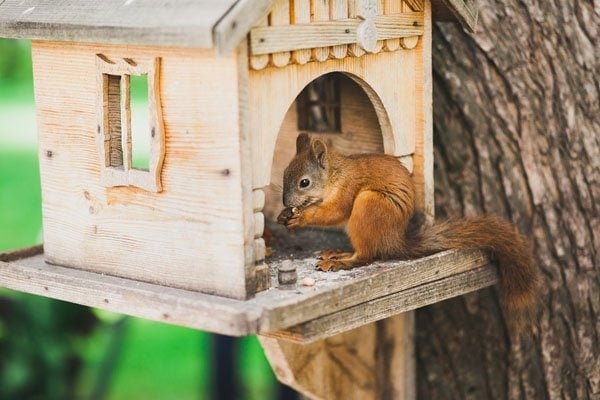
It’s tough when you have a feeder that attracts a lot of squirrels. They love the same food. You can keep them away in a few ways. You can “squirrel-proof” your feeder by spring loading the perches. This covers the feeding holes. Beware, squirrels are very smart and often figure these little contraptions out. You can put in a bowl on the pole to block the squirrels from climbing in. You can also feed the squirrels separately. They enjoy peanuts or corn.
Check out these “squirrel-proof” bird feeders. We have used them in our own yards and they are effective in reducing squirrels from raiding our bird seed!
What Type Of Seeds Are In Your Feeder?
Birds don’t just eat any seed. Each bird has its own type of dinner they love. Sometimes the less expensive seed mixes are filled with a lot of random fillers that some birds just don’t like. Most birds love black oil sunflower seeds. Cardinals like to dine on safflower seed. White proso millet seed is perfect for doves, juncos, and sparrows. Hummingbirds are notorious for their lovely sugar water. Suet is great for a lot of birds. Of course, some birds don’t really like seeds at all. Some enjoy caterpillars and berries.
What If The Birds Won’t Eat Their Seeds?
Most birds love to eat fresh food. They won’t eat it if it’s old and yucky. Goldfinches are very picky about their nyjer seeds. Birds of all types don’t like stale seeds. If their seeds are wet or full of cobwebs, they won’t eat it.
Do The Birds Like A Cover Over Them As They Eat?
Most birds like to escape from potential predators as they happily eat. A feeder in the middle of the yard might not be the best place for a bird feeder. Feeders right on top of bushes may attract hungry cats. If you need a cover, build a little brush pile. You can gather some little branches for a pile.
How Can I Fix Bird Feeding Issues?
Sometimes it’s great to get a bird feeder that dispenses only thistle seed. It keeps away large birds and varmints. The nyjer seed is tiny and requires a special type of feeder. Blackbirds and starlings won’t be interested in this type of food. If your nyjer feeder is a tube-style, the larger birds won’t even able to sit on it to eat. The goldfinches, purple finches, and chickadees will come in droves to enjoy the food. This type of seed also doesn’t make as big of a mess as other types of seeds under the feeder.
Bird feeders are a great way to attract beautiful birds and give them a place to dine at the same time. Though it can be hard to get the buffet stirring, birds will find it. Sit back and enjoy the show.

